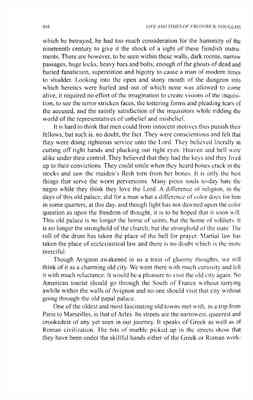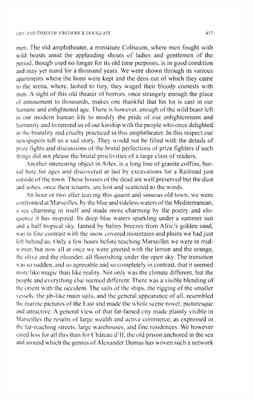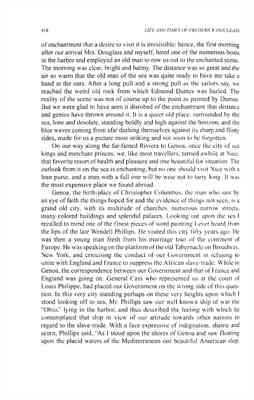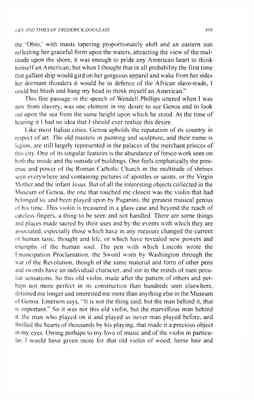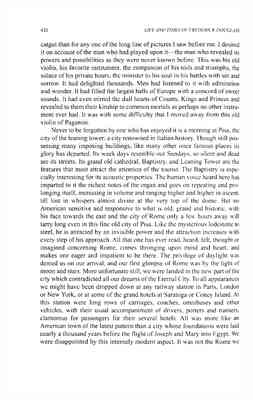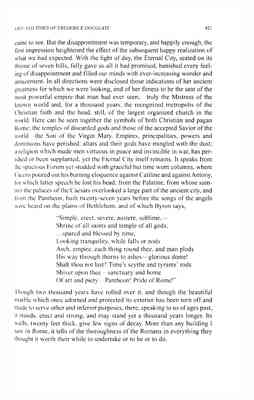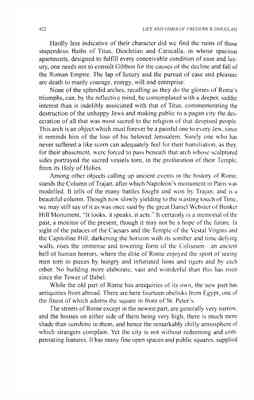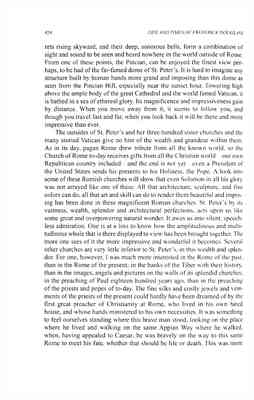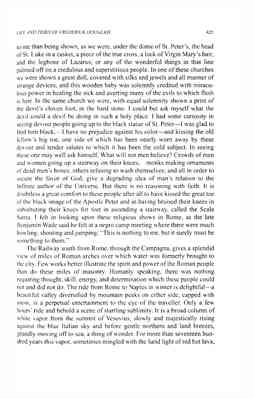Pages That Need Review
Life and Times, Third Part
42
416 LIFE AND TIMES OF FREDERICK DOUGLASS
which he betrayed, he had too much consideration for the humanity of the nineteenth century to give it the shock of a sight of these fiendish instruments. There are however, to be seen within these walls, dark rooms, narrow passages, huge locks, heavy bars and bolts; enough of the ghosts of dead and buried fanaticism, superstition and bigotry to cause a man of modem times to shudder. Looking into the open and stony mouth of the dungeon into which heretics were hurled and out of which none was allowed to come alive, it required no effort of the imagination to create visions of the inquisition, to see the terror stricken faces, the tottering forms and pleading tears of the accused, and the saintly satisfaction of the inquisitors while ridding the world of the representatives of unbelief and misbelief.
It is hard to think that men could from innocent motives thus punish their fellows, but such is, no doubt, the fact. They were conscientious and felt that they were doing righteous service unto the Lord. They believed literally in cutting off right hands and plucking out right eyes. Heaven and hell were alike under their control. They believed that they had the keys and they lived up to their convictions. They could smile when they heard bones crack in the stocks and saw the maiden's flesh torn from her bones. It is only the best things that serve the worst perversions. Many pious souls to-day hate the negro while they think they love the Lord. A difference of religion, in the days of this old palace, did for a man what a difference of color does for him in some quarters, at this day, and though light has not dawned upon the color question as upon the freedom of thought, it is to be hoped that it soon will. This old palace is no longer the home of saints, but the home of soldiers. It is no longer the stronghold of the church, but the stronghold of the state. The roll of the drum has taken the place of the bell for prayer. Martial law has taken the place of ecclesiastical law and there is no doubt which is the more merciful.
Though Avignon awakened in us a train of gloomy thoughts. we still think of it as a charming old city. We went there with much curiosity and left it with much reluctance. It would be a pleasure to visit the old city again. No American tourist should go through the South of France without tarrying awhile within the walls of Avignon and no one should visit that city without going through the old papal palace.
One of the oldest and most fascinating old towns met with, in a trip from Paris to Marseilles, is that of Aries. Its streets are the narrowest, queerest and crookedest of any yet seen in our journey. It speaks of Greek as well as of Roman civilization. The bits of marble picked up in the streets show that they have been under the skillful hands either of the Greek or Roman work-
43
LIFE AND TIMES OF FREDERICK DOUGLASS 417
men . The old amphitheater, a miniature Coliseum, where men fought with wild beasts amid the applauding shouts of ladies and gentlemen of the period, though used no longer for its old time purposes, is in good condition and may yet stand for a thousand years. We were shown through its various apartments where the lions were kept and the dens out of which they came to the arena, where, lashed to fury, they waged their bloody contests with men. A sight of this old theater of horrors, once strangely enough the place of amusement to thousands, makes one thankful that his lot is cast in our humane and enlightened age. There is however, enough of the wild beast left in our modern human life to modify the pride of our enlightenment and humanity and to remind us ofour kinship with the people who once delighted in the brutality and cruelty practiced in this amphitheater. In this respect our newspapers tell us a sad story. They would not be filled with the details of prize fights and discussions of the brutal perfections of prize fighters if such things did not please the brutal proclivities of a large class of readers.
Another interesting object in Aries, is a long line of granite coffins, buried here for ages and discovered at last by excavations for a Railroad just outside of the town. These houses of the dead are well preserved but the dust and ashes, once their tenants, are lost and scattered to the winds.
An hour or two after leaving this quaint and sinuous old town, we were confronted at Marseilles. by the blue and tideless waters of the Mediterranean, a sea charming in itself and made more charming by the poetry and eloquence it has inspired Its deep blue waters sparkling under a summer sun and a half tropical sky, fanned by balmy breezes from Africa golden sand, was in fine contrast with the snow covered mountains and plains we had just left hehind us. Only a few hours before reaching Marseilles we were in midwinter, but now all at once we were greeted with the lemon and the orange, the olive and the oleander, all flourishing under the open sky. The transition was so sudden, and so agreeable and so completely in contrast, that it seemed more like magic than like reality. Not only was the climate different, but the people and everything else seemed different. There was a visible blending of the orient with the occident. The sails of the ships, the rigging of the smaller vessels, the jib-like main sails, and the general appearance of all, resembled the marine pictures of the East and made the whole scene novel, picturesque and attractive. A general view of that far-famed city made plainly visible in Marseilles the results of large wealth and active commerce, as expressed in the far-reaching streets, large warehouses, and fine residences. We however cared less for all this than for Chateau d'If, the old prison anchored in the sea and around which the genius of Alexander Dumas has woven such a network
44
418 LIFE AND TIMES OF FREDERICK DOUGLASS
of enchantment that a desire to visit it is irresistible; hence, the first morning after our arrival Mrs. Douglass and myself, hired one of the numerous boats in the harbor and employed an old man to row us out to the enchanted scene. The morning was clear, bright and balmy. The distance was so great and the air so warm that the old man of the sea was quite ready to have me take a hand at the oars. After a long pull and a strong pull as the sailors say, we reached the weird old rock from which Edmond Dantes was hurled. The reality of the scene was not of course up to the point as painted by Dumas. But we were glad to have seen it disrobed of the enchantment that distance and genius have thrown around it. It is a queer old place, surrounded by the sea, lone and desolate, standing boldly and high against the horizon, and the blue waves coming from afar dashing themselves against its sharp and flinty sides, made for us a picture most striking and not soon to be forgotten.
On our way along the far-famed Riviera to Genoa, once the city of sea kings and merchant princes, we. like most travellers, tarried awhile at Nice, that favorite resort of health and pleasure and one beautiful for situation. The outlook from it on the sea is enchanting, but no one should visit Nice with a lean purse, and a man with a full one will be wise not to tarry long. It was the most expensive place we found abroad.
Genoa, the birth-place of Christopher Columbus, the man who saw by an eye of faith the things hoped for and the evidence of things not seen, is a grand old city, with its multitude of churches, numerous narrow streets, many colored buildings and splendid palaces. Looking out upon the sea I recalled to mind one of the finest pieces of word painting I ever heard from the lips of the late Wendell Phillips. He visited this city fifty years ago. He was then a young man fresh from his marriage tour of the continent of Europe. He was speaking on the platform of the old Tabernacle on Broadway, New York, and criticising the conduct of our Government in refusing to unite with England and France to suppress the African slave-trade. While in Genoa, the correspondence between our Government and that of France and England was going on. General Cass who represented us at the court of Louis Philippe, had placed our Government on the wrong side of this question. In this very city standing perhaps on these very heights upon which l stood looking off to sea, Mr. Phillips saw our well known ship of war the "Ohio," lying in the harbor, and thus described the feeling with which he contemplated that ship in view of our attitude towards other nations in regard to the slave-trade. With a face expressive of indignation, shame and scorn, Phillips said, "As I stood upon the shores of Genoa and saw floating upon the placid waters of the Mediterranean our beautiful American ship,
45
LIFE AND TIMES OF FREDERICK DOUGLASS 419
the 'Ohio,' with masts tapering proportionately aloft and an eastern sun reflecting her graceful form upon the waters, attracting the view of the multitude upon the shore, it was enough to pride any American heart to think himself an American; but when I thought that in all probability the first time that gallant ship would gird on her gorgeous apparel and wake from her sides her dormant thunders it would be in defence of the African slave-trade, I could but blush and hang my head to think myself an American."
This fine passage in the speech of Wendell Phillips uttered when I was new from slavery, was one element in my desire to see Genoa and to look out upon the sea from the same height upon which he stood. At the time of hearing it I had no idea that I should ever realize this desire.
Like most Italian cities, Genoa upholds the reputation of its country in respect of art. The old masters in painting and sculpture, and their name is legion, are still largely represented in the palaces of the merchant princes of this city. One of its singular features is the abundance of fresco work seen on both the inside and the outside of buildings. One feels emphatically the presence and power of the Roman Catholic Church in the multitude of shrines seen everywhere and containing pictures of apostles or saints, or the Virgin Mother and the infant Jesus. But of all the interesting objects collected in the Museum of Genoa, the one that touched me closest was the violin that had belonged to, and been played upon by Paganini, the greatest musical genius of his time. This violin is treasured in a glass case and beyond the reach of careless fingers. a thing to be seen and not handled. There are some things and places made sacred by their uses and by the events with which they are associated, especially those which have in any measure changed the current of human taste, thought and life, or which have revealed new powers and triumphs of the human soul. The pen with which Lincoln wrote the Emancipation Proclamation, the Sword worn by Washington through the war of the Revolution, though of the same material and form of other pens and swords have an individual character, and stir in the minds of men peculiar sensations. So this old violin, made after the pattern of others and perhaps not more perfect in its construction than hundreds seen elsewhere, detained me longer and interested me more than anything else in the Museum of Genoa. Emerson says, "It is not the thing said, but the man behind it, that is important." So it was not this old violin, but the marvellous man behind it, the man who played on it and played as never man played before, and thrilled the hearts of thousands by his playing, that made it a precious object in my eyes. Owing perhaps to my love of music and of the violin in particular, I would have given more for that old violin of wood, horse hair and
46
420 LIFE AND TIMES OF FREDERICK DOUGLASS
catgut than for any one of the long line of pictures I saw before me. I desired it on account of the man who had played upon it – the man who revealed its powers and possibilities as they were never known before. This was his old violin, his favorite instrument, the companion of his toils and triumphs, the solace of his private hours, the minister to his soul in his battles with sin and sorrow. It had delighted thousands. Men had listened to it with admiration and wonder. It had filled the largest halls of Europe with a concord of sweet sounds. It had even stirred the dull hearts of Counts, Kings and Princes and revealed to them their kinship to common mortals as perhaps no other instrument ever had. It was with some ditliculty that I moved away from this old violin of Paganini.
Never to be forgotten by one who has enjoyed it is a morning at Pisa, the city of the leaning tower: a city renowned in Italian history. Though still possessing many imposing buildings, like many other once famous places its glory has departed. Its week days resemble our Sundays, so silent and dead are its streets. Its grand old cathedral, Baptistry, and Leaning Tower are the features that most attract the attention of the tourist. The Baptistry is especially interesting for its acoustic properties. The human voice heard here has imparted to it the richest notes of the organ and goes on repeating and prolonging itself, increasing in volume and ranging higher and higher in ascent, till lost in whispers almost divine at the very top of the dome. But no American sensitive and responsive to what is old, grand and historic, with his face towards the east and the city of Rome only a few hours away will tarry long even in this fine old city of Pisa. Like the mysterious lodestone to steel, he is attracted by an invisible power and the attraction increases with every step of his approach. All that one has ever read, heard, felt, thought or imagined concerning Rome, comes thronging upon mind and heart, and makes one eager and impatient to be there. The privilege of daylight was denied us on our arrival, and our first glimpse of Rome was by the light of moon and stars. More unfortunate still, we were landed in the new part of the city which contradicted all our dreams of the Eternal City. To all appearances we might have been dropped down at any railway station in Paris, London or New York, or at some of the grand hotels at Saratoga or Coney Island. At this station were long rows of carriages, coaches, omnibuses and other vehicles, with their usual accompaniment of drivers, porters and runners, clamorous for passengers for their several hotels. All was more like an American town of the latest pattern than a city whose foundations were laid nearly a thousand years before the flight of Joseph and Mary into Egypt. We were disappointed by this intensely modern aspect. It was not the Rome we
47
LIFE AND TIMES OF FREDERICK DOUGLASS 421
came to see. But the disappointment was temporary, and happily enough, the first impression heightened the effect of the subsequent happy realization of what we had expected. With the light of day, the Eternal City, seated on its throne of seven hills, fully gave us all it had promised, banished every feeling of disappointment and filled our minds with ever-increasing wonder and amazement. In all directions were disclosed those indications of her ancient greatness for which we were looking, and of her fitness to be the seat of the most powerful empire that man had ever seen;-truly the Mistress of the known world and, for a thousand years, the recognized metropolis of the Christian faith and the head, still, of the largest organized church in the world. Here can be seen together the symbols of both Christian and pagan Rome: the temples of discarded gods and those of the accepted Savior of the world – the Son of the Virgin Mary. Empires, principalities, powers and dominions have perished: altars and their gods have mingled with the dust; a religion which made men virtuous in peace and invincible in war, has perished or been supplanted, yet the Eternal City itself remains. It speaks from the spacious Forum yet studded with graceful but time worn columns, where Cicero poured out his burning eloquence against Catiline and against Antony, for which latter speech he lost his head: from the Palatine, from whose summit the palaces of the Caesars overlooked a large part of the ancient city, and from the Pantheon. built twenty-seven years before the songs of the angels were heard on the plains of Bethlehem. and of which Byron says,
"Simple, erect, severe, austere, sublime, Shrine of all saints and temple of all gods. ... spared and blessed by time. Looking tranquility. while falls or nods Arch, empire, each thing round thee, and man plods His way through thorns to ashes – glorious dome! Shalt thou not last'? Time's scythe and tyrants' rods Shiver upon thee – sanctuary and home Of art and piety – Pantheon! Pride of Rome!"
Though two thousand years have rolled over it, and though the beautiful marble which once adorned and protected its exterior has been torn off and made to serve other and inferior purposes, there, speaking to us of ages past, it stands, erect and strong, and may stand yet a thousand years longer. Its walls, twenty feet thick, give few signs of decay. More than any building I saw in Rome, it tells of the thoroughness of the Romans in everything they thought it worth their while to undertake or to be or to do.
48
422 LIFE AND TIMES OF FREDERICK DOUGLASS
Hardly less indicative of their character did we find the ruins of those stupendous Baths of Titus, Diocletian and Caracalla, in whose spacious apartments, designed to fulfill every conceivable condition of ease and luxury, one needs not to consult Gibbon for the causes of the decline and fall of the Roman Empire. The lap of luxury and the pursuit of ease and pleasure are death to manly courage, energy, will and enterprise.
None of the splendid arches, recalling as they do the glories of Rome's triumphs, can, by the reflective mind, be contemplated with a deeper, sadder interest than is indelibly associated with that of Titus, commemorating the destruction of the unhappy Jews and making public to a pagan city the desecration of all that was most sacred to the religion of that despised people. This arch is an object which must forever be a painful one to every Jew, since it reminds him of the loss of his beloved Jerusalem. Surely one who has never suffered a like scorn can adequately feel for their humiliation, as they, for their abasement, were forced to pass beneath that arch whose sculptured sides portrayed the sacred vessels tom, in the profanation of their Temple, from its Holy of Holies.
Among other objects calling up ancient events in the history of Rome, stands the Column of Trajan, after which Napoleon's monument in Paris was modelled. It tells of the many battles fought and won by Trajan, and is a beautiful column. Though now slowly yielding to the wasting touch of Time, we may still say of it as was once said by the great Daniel Webster of Bunker Hill Monument, "It looks, it speaks, it acts." It certainly is a memorial of the past, a monitor of the present, though it may not be a hope of the future. In sight of the palaces of the Caesars and the Temple of the Vestal Virgins and the Capitoline Hill, darkening the horizon with its somber and time defying walls, rises the immense and towering form of the Coliseum – an ancient hell of human horrors, where the elite of Rome enjoyed the sport of seemg men tom to pieces by hungry and infuriated lions and tigers and by each other. No building more elaborate, vast and wonderful than this has risen since the Tower of Babel.
While the old part of Rome has antiquities of its own, the new part has antiquities from abroad. There are here fourteen obelisks from Egypt, one of the finest of which adorns the square in front of St. Peter's.
The streets of Rome except in the newest part, are generally very narrow. and the houses on either side of them being very high, there is much more shade than sunshine in them, and hence the remarkably chilly atmosphere of which strangers complain. Yet the city is not without redeeming and compensating features. It has many fine open spaces and public squares, supplied
49
THE LIFE AND TIMES OF FREDERICK DOUGLASS 423
with large flowing fountains and adorned with various attractive devices, where the people have abundant pure water, fresh air, and bright, healthgiving sunlight.
Of street life in Rome I must not speak except to mention one feature of it which overtops all others, and that is the part taken both consciously and unconsciously by members of various bodies of the Church. All that we see and hear impresses us with the gigantic, all-pervading, complicated, accumulated and mysterious power of this great religious and political organization. Wherever else the Roman Church may question its own strength and practice a modest reserve, here she is open, free, self-asserting and bold in her largest assumptions. She writes indulgences over her gateways as boldly to-day as if Luther had never lived and she jingles the keys of heaven and hell as confidently as if her right to do so had never been called into question. About every fifth man met with holds some official relation to this stupendous and far-reaching body and is at work in some way to maintain its power, ascendency and glory. Religion seems to be in Rome the chief business by which men live. Throngs of young students of all lands and languages march through the streets at all hours of the day, but never unattended. Experienced, well-dressed, discreet and dignified ecclesiastics attend them everywhere. On the surface these dear young people, so pure and in the full fresh bloom of youth, are beautiful to look upon; but when you reflect that they are being trained to defend dogmas and superstitions contrary to the progress and enlightenment of the age the spectacle becomes sad indeed.
In contrast to them are other specimens of religious zeal neither pleasant to the eye, to the touch nor even to the thought. They are the vacant-faced, barelegged. grimy monks. who have taken a vow neither to marry, nor to work, nor to wash, and to live by prayer;—who beg and pay for what they get by praying for the donors. It is strange that such fanaticism is encouraged hy a church so worldly-wise as that of Rome, and yet in this I may be less wise than the Church. She may have a use for them too occult for my dim vision.
The two best points from which to view the exterior of Rome are the Pincian Hill and the Janiculum. Of the seven hills these are not the least interesting, and from their summits can be taken in its full magnificence, a general view of the Eternal City. Once seen from these points, it will never he forgotten but will dwell in the mind forever. A glance reveals all the great features of the city, with its grand and impressive surroundings. Here begins the far-reaching and much dreaded Campagna, and at one's feet lies a whole forest of grand historical churches, which with their domes, towers and tur-
50
424 LIFE AND TIMES OF FREDERICK DOUGLASS
rets rising skyward, and their deep, sonorous bells, form a combination of sight and sound to be seen and heard nowhere in the world outside of Rome. From one of these points, the Pincian, can be enjoyed the finest view perhaps, to be had of the far-famed dome of St. Peter's. It is hard to imagine any structure built by human hands more grand and imposing than this dome as seen from the Pincian Hill, especially near the sunset hour. Towering high above the ample body of the great Cathedral and the world famed Vatican, it is bathed in a sea of ethereal glory. Its magnificence and impressiveness gain by distance. When you move away from it, it seems to follow you, and though you travel fast and far, when you look back it will be there and more impressive than ever.
The outsides of St. Peter's and her three hundred sister churches and the many storied Vatican give no hint of the wealth and grandeur within them. As in its day, pagan Rome drew tribute from all the known world, so the Church of Rome to-day receives gifts from all the Christian world-- our own Republican country included~and the end is not yet · even a President of the United States sends his presents to his Holiness. the Pope. A look into some of these Romish churches will show that even Solomon in all his glory was not arrayed like one of these. All that architecture. sculpture. and tine colors can do, all that art and skill can do to render them beautiful and imposing has been done in these magnificent Roman churches. St. Peter's by its vastness, wealth, splendor and architectural perfections. acts upon us like some great and overpowering natural wonder. It awes us into silent, speechless admiration. One is at a loss to know how the amplitudinous and multitudinous whole that is there displayed to view has been brought together. The more one sees of it the more impressive and wonderful it becomes. Several other churches are very little inferior to St. Peter's, in this wealth and splendor. For one, however, I was much more interested in the Rome of the past, than in the Rome of the present; in the banks of the Tiber with their history, than in the images, angels and pictures on the walls of its splendid churches; in the preaching of Paul eighteen hundred years ago, than in the preaching of the priests and popes of to-day. The fine silks and costly jewels and vestments of the priests of the present could hardly have been dreamed of by the first great preacher of Christianity at Rome, who lived in his own hired house, and whose hands ministered to his own necessities . It was something to feel ourselves standing where this brave man stood, looking on the place where he lived and walking on the same Appian Way where he walked, when, having appealed to Caesar, he was bravely on the way to this same Rome to meet his fate, whether that should be life or death. This was more
51
LIFE AND TIMES OF FREDERICK DOUGLASS 425
to me than being shown, as we were, under the dome of St. Peter's, the head of St. Luke in a casket, a piece of the true cross, a lock of Virgin Mary's hair, and the legbone of Lazarus; or any of the wonderful things in that line palmed off on a credulous and superstitious people. In one of these churches we were shown a great doll, covered with silks and jewels and all manner of strange devices, and this wooden baby was solemnly credited with miraculous power in healing the sick and averting many of the evils to which flesh is heir. In the same church we were, with equal solemnity shown a print of the devil's cloven foot, in the hard stone. I could but ask myself what the devil could a devil be doing in such a holy place. I had some curiosity in seeing devout people going up to the black statue of St. Peter-I was glad to find him black. – I have no prejudice against his color – and kissing the old fellow's big toe, one side of which has been nearly worn away by these dernut and tender salutes to which it has been the cold subject. In seeing these one may well ask himself, What will not men believe? Crowds of men and women going up a stairway on their knees;– monks making ornaments of dead men's bones; others refusing to wash themselves; and all in order to secure the favor of God, give a degrading idea of man's relation to the Infinite author of the Universe. But there is no reasoning with faith. It is doubtless a great comfort to these people after all to have kissed the great toe of the black image of the Apostle Peter and in having bruised their knees in substituting their knees for feet in ascending a stairway, called the Scala Santa. I felt in looking upon these religious shows in Rome, as the late Benjamin Wade said he felt at a negro camp meeting where there were much howling, shouting and jumping; "This is nothing to me, but it surely must be something to them."
The Railway south from Rome, through the Campagna, gives a splendid view of miles of Roman arches over which water was formerly brought to the city. Few works better illustrate the spirit and power of the Roman people than do these miles of masonry. Humanly speaking, there was nothing requiring thought, skill, energy. and determination which these people could not and did not do. The ride from Rome to Naples in winter is delightful– a beautiful valley diversified by mountain peaks on either side, capped with snow, is a perpetual entertainment to the eye of the traveller. Only a few hours' ride and behold a scene of startling sublimity. It is a broad column of white vapor from the summit of Vesuvius, slowly and majestically rising against the blue Italian sky and before gentle northern and land breezes, grandly moving off to sea, a thing of wonder. For more than seventeen hundred years this vapor, sometimes mingled with the lurid light of red hot lava,
